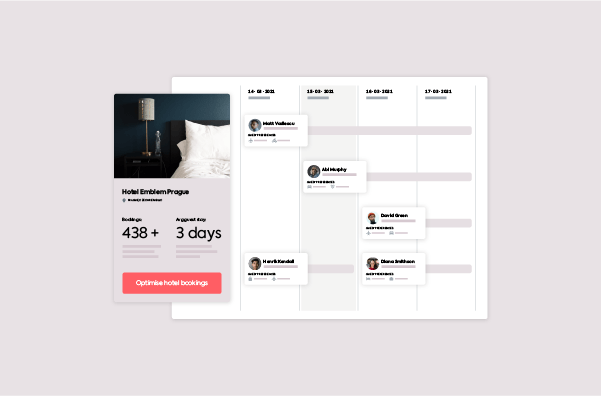Table of contents
As software moves from on-premises to cloud, it's more and more important to understand not only what its current features are, but how it’s going to evolve in the coming weeks, months and years. You're no longer buying a static version on a CD-ROM to be installed in your server room. You're subscribing to a platform that will be adding new features every week. But how can you tell whether you'll like this new functionality? Product principles are an invaluable guide.
According to partners at Silicon Valley Product Group:
"Product principles refer to the nature of the product you are building, and they help you to get a much clearer picture of what you believe in and what is important."
By sharing our product principles with you, we want you to understand the key qualities of our product and therefore what qualities you can expect from any of our future releases.
As an example, as software evolves it can become overly complex and its user interface could potentially degrade in a way that it slows you down and becomes unusable. It’s our product principles that help us evolve our platform in a way that with every release, we’re saving you even more time. But there’s much more and that’s why we've decided to share our principles with you so that you understand what’s important to us, and therefore how we’re going to improve the product in the future.
Before we dive into a more detailed exploration, let's take a quick look at the eight Mews product principles.
1. Human
We remove barriers to stimulate meaningful human to human interaction.
2. Automated
People should avoid doing tasks that systems can perform independently.
3. Self-explanatory
Everything we design must be easy. The system should guide the user every step of the way.
4. Fast
We emphasize simplicity for every action in the system, because time matters.
5. User appropriate
We've created a system for professionals and guests alike. Usability and correct actions are essential.
6. Deconstructed
We radically rethink systems in order to build modern full-scale solutions.
7. Multi-service
We should all benefit from the synergies between multiple services and their underlying operations.
8. Universal
We build solutions that have multiple use cases instead of trying to solve one problem at a time.
Over time, we realized that Mews offers much more than just a product in the form of a software suite. With innovative software, there’s a certain portion of cutting-edge knowledge that we’re sharing from the first moment we meet a new (potential) customer. It’s not enough to map and understand the property operations when trying to sell the software – we’re expected and eager to elevate the existing operation by implementing our platform.
That’s why our customer facing teams – sales managers, sales engineers, customer success and customer support – need to be extremely knowledgeable and share that knowledge in various forms. Designing a proper customer journey, doing regular business reviews and providing timely and professional support has become an integral part of our product.
Automation is vital for human interactions
First and foremost, the system must be highly usable. We try to automate everything that can be automated so that we create more time for real hospitality. If a computer can do it on its own, why would we ask a person to do it? Instead, they can speak with the customer and participate on their remarkable experience.
“No screen” is the best screen, because that allows us to cater for real human to human interactions. Mews was originally built to support a reception-less hotel, not to make everything digital and distant, but, quite the opposite, to allow humans to talk to each other without barriers. The real hospitality happens between people, without computers.
High performance meets high usability
Sadly, not everything can be fully automated. But that’s just another opportunity for us to provide you with great technology. With everything we build, we always keep the job that you need to do in our minds. We ensure that every action can be performed as fast as possible. That holds not just for a technical speed of an individual click, but for the whole workflow related to actions that you’d want to take. No one has ever enjoyed watching a receptionist typing numbers into a computer.
This goes hand in hand with all our products being self-explanatory. We’re not building an airplane that needs an extremely difficult user interface with tens of thousands of pages about how to use it. The work on this never ends, but we’re always closer to a state where you no longer need a trained specialist to work at the front office, because they will be able to use Mews as easily as they use their Facebook.
True cloud flexibility
There’s a lot that can be done in the hospitality industry if you have a look at existing software solutions. Many of them still contain a lot of functionalities and limitations from their versions made for DOS. For decades, all this software has been updated visually to fit into newer and newer versions of Windows, but not much has been revised in terms of the underlying functionality and workflows, not to mention connectivity. They may have all the features you can think of, but that’s only possible because what was once built hasn’t been revised since then.
Mews is built in the cloud because everything and everyone is now on the Internet. Starting with your website, and including channels, revenue management systems and much more… but mainly, the guests are. Building Mews in the cloud enabled us to move away from the state where hotel employees are manual proxies inputting data into a computer just because they are the only ones to have access to it and know how to use it.
We always aim for the right user to perform a given task. As one of the most visible examples, we started with online check-in performed by the guest as they can input their own data more accurately and faster than a night-shift reception staff. But, imagine, for instance, if a travel agent would be able to book with you directly and manage their blocks instead of you retyping their orders from e-mails.
Some of the most basic concepts in hospitality are more computer-friendly than human-friendly. Think of room categories as an example. You’re expected to read a room category description to fully understand what kind of room you’re booking and the difference between Queen Dom and Queen Dom Courtyard. Room categories were designed just as an aggregation for computers to store less data and it was normal for a salesperson to sell them to you and explain each category.
We can see many examples like this one and we’re challenging them one by one, looking for deconstructed solutions. Rather than expecting guests to read paragraphs of room category description, we should drop that aggregation and offer them a user-friendly booking engine that allows them to filter rooms based on their own preferences.
Accommodating more than just accommodation
Traditionally, properties are only selling accommodation, usually per night, though sometimes for even shorter periods of time, like at the airport. But why can't you sell a room as an office for day use? What if you have empty meeting rooms or a bowling alley? And what if your guests want to book all of those at once? Usually, you would need to touch a whole bunch of systems to register such a multi-service booking. Since the beginning, we’re structuring Mews’ code to ensure that we’ll support much more than accommodation and that all parts of the system can work for other kinds of business models than just selling overnight stays in rooms.
Finally, we hate bloat. Whenever we’re trying to solve a problem, we step back a bit and see how different problems are related so that we can find a universal solution for them so that we cover more problems with fewer features. That results to a system that is simpler, yet more powerful.
A great example of what are we working on is what we call attribute-based pricing. Usually, a property management system would have multiple price fields for a rate or product to allow for child pricing. But being a child really is just you matching a rule with your identity attribute – age. So why wouldn’t you want to set up more rules for any different attributes of customers, companions or bookings? Instead of giving you dozens of fields to fill in, we’ll give you a simple UI to set up your own pricing strategy. And, by the way, it allows for children pricing.
A remarkable future awaits
In the text above, I have shared with you some of our work in progress and some of our concepts. I see these as great examples of how product principles guide us to build a solution that’s a class above the existing solutions and will work for the future and, most probably, help us re-shape the future together with you. What’s still important to realize is that no matter how good a solution we build, it’s still up to you to take that tool and use it in a great way, elevate the industry, and provide remarkable experiences to all your guests and partners.

Author
Jirka Helmich
Jiří (or Jirka) is one of the longest serving members of Mews, having been innovating with us since 2014. He's now our CPO (Chief Product Officer) and is as determined as ever to disrupt hospitality with great products.

Essential hotel technology for general managers
Download now
Hospitality hot takes straight to your inbox


.webp)